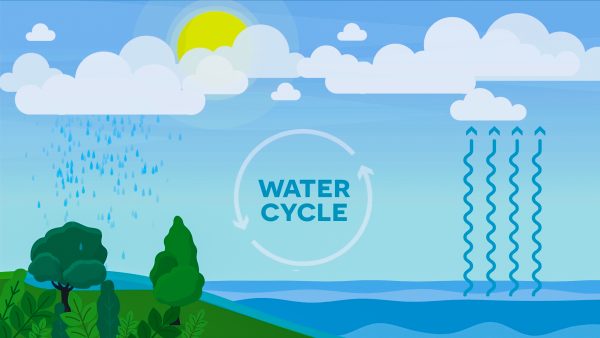Distillation Definition
Distillation purifies liquid by boiling into gas, then cooling into liquid. For example, separating water from a mixture.
View Lesson on Water Cycle (3-5 Version)
Become a member to get full access to our entire library of learning videos, reading material, quiz games, simple DIY activities & more.
Become a member to get full access to our entire library of learning videos, quiz games, & more.
Plans & Pricingto watch this full video.

Access All Videos
and Lessons, No Limits.
Access All Videos

No credit card required,
takes 7 sec to signup.
No card required

Ready-to-go lessons
that save you time.
Ready-to-go lessons
If you are on a school computer or network, ask your tech person to whitelist these URLs:
*.wistia.com, fast.wistia.com, fast.wistia.net, embedwistia-a.akamaihd.net
Sometimes a simple refresh solves this issue. If you need further help, contact us.
Water Cycle (3-5 Version)
Fun Facts
- Water becomes cleaner when it evaporates, leaving particles behind.
- Grass and dirt do not evaporate during the distillation process.
- During distillation, vapor cools and becomes liquid again in a collection tube.
Why Do We Need To Know About Distillation
Learning about distillation helps us understand how many things in our daily life work and why it’s important in different jobs. For example, distillation helps explain how drinking water can be purified. You can distill water yourself in a solar bowl.
This idea is also used in studying the environment and weather, and understand the water cycle. Knowing about distillation is useful for people working in these areas and helps us know why things happen.
Frequently Asked Questions
Check out the Full Lesson on Water Cycle (3-5 Version)
In this lesson, we learn that:
- Water on Earth is millions of years old and is constantly being recycled.
- Water vapor is constantly evaporating from the surface of the Earth.
- Water vapor in the air condenses to form clouds.
- Water falls back to earth and the cycle repeats.
Related Topics
- Algae Definition
- Binary Code Definition
- Chemical Reaction Definition
- Chloroplast Definition
- Circulatory System Definition
- Collision Definition
- Computer Programming Definition
- Condensation Definition
- Distillation Definition
- Divergent Boundary Definition
- Element Definition
- Erosion Definition
- Evaporation Definition
- Fossil Definition
- Gas Definition
- Geologic Processes Definition
- Geologic Time Scale Definition
- Glacier Definition
- Group Behavior Definition
- Humidity Definition
- Igneous Rock Definition
- Landslide Definition
- Lever Definition
- Light Reflection Definition
- Liquid Definition
- Metamorphosis Definition
- Meteorologist Definition
- Mineral Definition
- Phases Of The Moon Definition
- Photosynthesis Definition
- Plant Growth Definition
- Pollution Definition
- Property Definition
- Push Definition
- Sediment Filter Definition
- Seeing Definition
- Smelling Definition
- Sound Definition
- Sound Wave Definition
- Species Definition
- States Of Matter Definition
- Surface Runoff Definition
- Trace Fossil Definition
- Tsunami Definition
- Water Cycle Definition
- Watershed Definition
- Weather Definition
- Wind Erosion Definition
Start a Free Trial Today. Get a $5 Amazon Gift Card!
Teachers! Start a free trial & we'll send your gift card within 1 day. Only cards left. Try it now.
Select Grade
Select Subject
This email is associated with a Science Kit subscription. Kit subscriptions are managed on this separate page: Manage Subscription

-
Download InvoiceScience & Math$/yr
-
Download InvoiceScience Only$/yr

access all lessons
• No credit card required •
"My students loved the videos. I started the video subscription in May and used them as a review before the state test, which I know contributed to 100% of my class passing the state test."
Rhonda Fox 4th Grade Teacher, Ocala, Florida
• No credit card required •
"My students loved the videos. I started the video subscription in May and used them as a review before the state test, which I know contributed to 100% of my class passing the state test."
Rhonda Fox 4th Grade Teacher, Ocala, Florida
• No credit card required •
Already a member? Sign In
* no credit card required *

* no credit card required *
* no credit card required *


no credit card required
Skip, I will use a 3 day free trial
Enjoy your free 30 days trial
-
Unlimited access to our full library
of videos & lessons for grades K-5. -
You won’t be billed unless you keep your
account open past your 14-day free trial. -
You can cancel anytime in 1 click on the
manage account page or by emailing us.
-
Unlimited access to our full library of videos & lessons for grades K-5.
-
You won't be billed unless you keep your account open past 14 days.
-
You can cancel anytime in 1-click on the manage account page.
Cancel anytime in 1-click on the manage account page before the trial ends and you won't be charged.
Otherwise you will pay just $10 CAD/month for the service as long as your account is open.
Cancel anytime on the manage account page in 1-click and you won't be charged.
Otherwise you will pay $10 CAD/month for the service as long as your account is open.
We just sent you a confirmation email. Enjoy!
DoneWe use cookies to make your experience with this site better. By using this site you agree to our use of cookies. Click "Decline" to delete and block any non-essential cookies for this site on this specific property, device, and browser. Please read our privacy policy for more information on the cookies we use.Learn More
We use cookies to improve your experience. By using this site, you agree to our use of cookies. Click "Decline" to block non-essential cookies. See our privacy policy for details.Learn More



























































































































